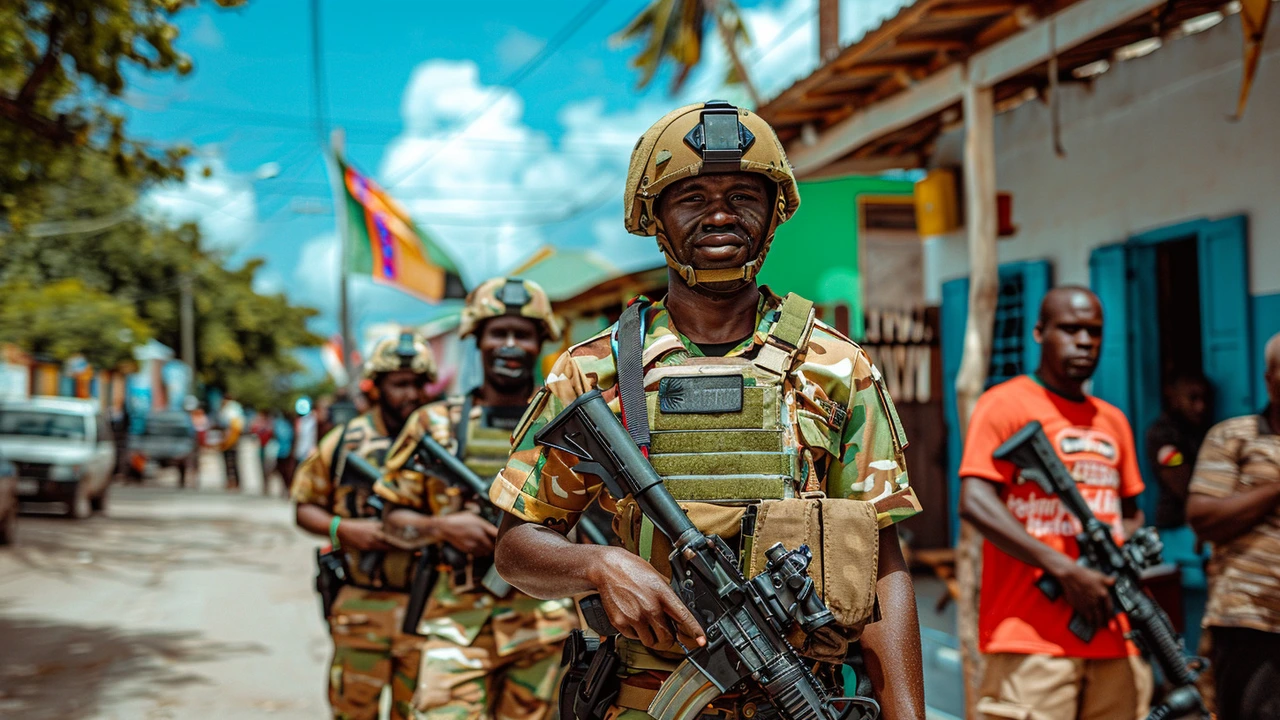Kenyan National Police Service Debunks False Reports on Officers' Safety in Haiti
The National Police Service (NPS) of Kenya has categorically dismissed recent reports suggesting that Kenyan police officers stationed in Haiti as part of the United Nations Stabilization Mission in Haiti (MINUSTAH) have been killed. Circulating widely on social media, these rumors claimed the deaths of several Kenyan officers, causing widespread concern and uncertainty. However, NPS spokesperson Bruno Shioso has clarified that these claims are entirely unfounded, labeling them as 'fake news.'
Shioso emphasized that all Kenyan police officers serving in Haiti are safe and in good health. The NPS also indicated that these false reports were likely spread by individuals with malicious intentions, aiming to create panic and mistrust. He reassured the public that the police contingent in Haiti is 'intact,' and no casualties have been reported. Shioso urged citizens to disregard these baseless claims and instead seek information from reliable and authorized sources to avoid being misled by fake news.
The deployment of Kenyan police to Haiti was part of the United Nations' peacekeeping efforts aimed at maintaining peace and stability in the Caribbean nation. Since its inception in 2004, MINUSTAH has been instrumental in assisting the Haitian government to stabilize the country and promote economic development following years of political turmoil and natural disasters. Kenyan officers are among the international contingent providing essential support to these efforts.
A Closer Look at MINUSTAH's Mandate and Role
MINUSTAH, established in 2004, was primarily tasked with restoring a secure and stable environment in Haiti, promoting the political process, strengthening the country's government institutions, and fostering social and economic development. The mission also aimed at protecting human rights and supporting local law enforcement capacities. Through these comprehensive mandates, MINUSTAH aimed to aid Haiti in overcoming its challenges and setting a course for sustainable development.
The involvement of Kenyan police officers in MINUSTAH underscores the global collaborative effort within the United Nations peacekeeping framework. Kenyan authorities have been proactive in contributing to such international missions, underscoring their commitment to global peace and security. As part of MINUSTAH, Kenyan police officers work alongside other international contingents, providing critical assistance in policing, public order management, and mentoring the Haitian National Police.
The Spread of Fake News: A Growing Concern
The spread of misinformation and fake news via social media platforms has become a significant concern globally. Such false reports can create panic, misinform the public, and undermine trust in official institutions. The recent false claims about the Kenyan police in Haiti highlight the need for vigilance and critical assessment of information. It is essential to consult credible sources and authorities before accepting and sharing news, particularly on sensitive matters involving the safety of individuals and national security issues.
In this digital age, verifying information before dissemination is crucial. Authorities like the NPS play a vital role in promptly discrediting false information and providing the public with accurate and reliable news. The spread of fake news serves as a reminder of the importance of media literacy and the responsibility that comes with the consumption and sharing of information.
The Importance of Authorized Information Channels
With the prevalence of fake news, it is vital for the public to rely on authorized sources for accurate and trustworthy information. Government agencies, credible news outlets, and official social media channels of recognized institutions remain the best sources for verified news. The NPS has been proactive in ensuring the public stays informed about the safety and well-being of Kenyan police officers deployed abroad.
The NPS continues to monitor the situation closely and assures the Kenyan public that all measures are in place to ensure the safety and effectiveness of their officers serving in international missions. The Kenyan police's dedication to their roles in peacekeeping missions reflects the country's commitment to contributing to global peace and stability.
The Kenyan police officers in Haiti embody the spirit of international cooperation and solidarity. Despite the challenges posed by misinformation, their presence and efforts in Haiti remain crucial in supporting MINUSTAH's mandates. As the misinformation is addressed and corrected, the focus shifts back to the essential work being done on the ground by Kenyan and international peacekeepers.
Conclusion
The National Police Service of Kenya has successfully debunked the false reports about the alleged deaths of its officers in Haiti. As the issue of fake news continues to pose challenges, it is incumbent upon individuals to seek information from reliable and authorized sources. The dedicated efforts of Kenyan police officers in Haiti reflect their commitment to peace and stability in collaboration with international partners. The NPS continues to assure the public of the well-being and safety of its officers, maintaining transparency and trust through authorized communication channels.







william wijaya
July 2, 2024 AT 19:06 PMReading through the NPS statement feels like a breath of fresh air amidst a haze of misinformation; the sheer volume of sensationalist chatter can derail public trust in a heartbeat. I empathize with anyone who’s been jolted by those unsettling rumors-our collective anxiety is a natural response to perceived threats. Yet, the factual integrity here is evident: the officers are alive, healthy, and fully operational, which underscores the importance of stringent information hygiene. The dissemination of “fake news” not only hampers operational integrity but also fuels unnecessary panic, a phenomenon we should actively counter. Let’s champion reliable sources and keep the discourse grounded in verified facts.
Lemuel Belleza
July 2, 2024 AT 20:30 PMThese rumors are just noise.
faye ambit
July 2, 2024 AT 21:53 PMIt is essential to recognize how swiftly misinformation can erode societal cohesion, especially when it concerns the safety of those serving abroad. The responsible approach is to cultivate a habit of critical reflection before accepting any claim at face value. By fostering media literacy, we empower individuals to discern credible reports from sensational fabrications. Moreover, acknowledging the genuine dedication of Kenyan officers in Haiti can strengthen international solidarity. We should also consider the psychological impact on families of peacekeepers when unfounded stories proliferate. A collective commitment to authoritative sources not only protects reputations but also upholds the dignity of the mission. Ultimately, informed dialogue nurtures trust between citizens and institutions. Let us therefore prioritize verification and empathy in our digital interactions.
Subhash Choudhary
July 2, 2024 AT 23:16 PMHonestly, it’s pretty chill to see the NPS set the record straight-no need to get worked up over hearsay. The facts are clear, and it’s a reminder to keep our heads cool when the internet starts buzzing with drama. Staying grounded helps us avoid the whole panic‑mode that spreads so fast online.
Ethan Smith
July 3, 2024 AT 00:40 AMYour observations about media literacy are well‑articulated and underscore a vital societal need. It is worth noting that the rapid propagation of unverified claims can compromise public confidence in legitimate institutions. By consistently referencing official communications, we reinforce a culture of accuracy. Additionally, encouraging critical assessment safeguards both the reputation of peacekeeping forces and the emotional well‑being of their families. Maintaining such standards is essential for democratic discourse.
Evelyn Monroig
July 3, 2024 AT 02:03 AMThe recent debunking by the Kenyan National Police Service is nothing more than a coordinated narrative to mask deeper, covert operations that are being hidden from the public eye. It is widely understood among seasoned analysts that such "official statements" are often crafted to distract from clandestine activities involving geopolitical maneuvering and resource extraction. The timing of the announcement aligns eerily with undisclosed troop movements and classified logistics shipments destined for strategic locations. One must consider the possibility that these peacekeepers are enablers of a larger agenda that extends beyond mere humanitarian assistance. Moreover, the language employed-carefully chosen to appear reassuring-betrays an underlying intent to quell dissent and control the information flow. The pattern is consistent: a wave of panic is incited, only to be smothered by a polished, authoritative rebuttal that demands trust without scrutiny. This cycle repeats across multiple theatres where Western-aligned forces operate under the veneer of peacekeeping. It is also telling that the NPS has not provided any granular details about the officers' specific duties, locations, or operational protocols, which would be standard in a transparent report. Their omission suggests a deliberate effort to conceal involvement in operations that may contravene international law. Furthermore, the emphasis on "fake news" serves to delegitimize independent journalists and whistleblowers who might otherwise expose the truth. The public must remain vigilant, recognizing that such dismissals are often tactics to silence legitimate inquiry. In an era where misinformation is weaponized, discerning the genuine from the fabricated becomes a civic responsibility. The truth, obscured as it may be, will eventually surface, revealing the intricate web of hidden motives behind the so‑called peacekeeping mission.